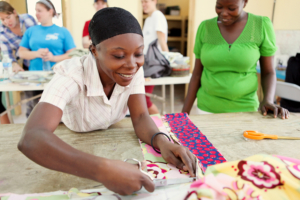Glamour Boutique: By Women, For Women
 There are a number of advancements in legal gender rights across the world. However, social norms still play a large role in preventing women from attaining economic independence. Globally, women are almost three times more likely than men to work in the unpaid sector—namely domestic work and caring for children. When the women who are confined to this lifestyle are able to find paid work, it is often part-time and low-wage. This sets them at a significant financial disadvantage. They must depend on their husbands and families to provide for their basic needs.
There are a number of advancements in legal gender rights across the world. However, social norms still play a large role in preventing women from attaining economic independence. Globally, women are almost three times more likely than men to work in the unpaid sector—namely domestic work and caring for children. When the women who are confined to this lifestyle are able to find paid work, it is often part-time and low-wage. This sets them at a significant financial disadvantage. They must depend on their husbands and families to provide for their basic needs.
The Fix
The Inclusive and Equitable Local Development (IELD) sector of the United Nations Capital Development Fund fights to right these wrongs. They invest in small businesses in developing countries that are largely run by women. Through their investments, these businesses expand, hire more people, increase their consumer market and earn more money. When women achieve financial independence, the reward is multiplied. Economically secure women are likely to invest in education, health and their community.
The Entrepreneur
One of these businesses that the IELD benefits is Glamour Boutique—a fashion business in Jessore, a small town in southwestern Bangladesh.
Glamour Boutique was officially founded in 2007 by Parveen Akhter. Akhter had been kidnapped and forced into child marriage when she was in the ninth grade. Her husband—her kidnapper and a drug addict—made it a habit of abusing her throughout their seventeen-year marriage. Encouragement from her oldest son, 16-years-old at the time, led her to file for divorce and set up the Glamour Boutique House and Training Centre. It was based in her home and capitalized on the embroidery and tailoring skills Akhter had taught herself over the years. Once business picked up, she moved into a rented space.
This is when the IELD stepped in. Akhter had little money, a small market and limited machines. They loaned her nearly 30,000 USD to expand. Since then, Glamour Boutique has employed over 50 women and consistently trains around 20 in tailoring and embroidery.
More than anything, the company is female-friendly. It helps to lift women out of poverty and give them a purpose and community. Additionally, she is sensitive to her employees having outside commitments. She offers short four-hour shifts for women who are enrolled in school, have children or have other situations warranting a flexible schedule.
Mussamad Nafiza, an employee at Glamour Boutique, testifies to the beauty of working there. She describes her own and others’ financial gain and independence as well as her dreams of opening a business similar to Akhter’s. Dipa Monjundar, a friend of Akhter’s and fellow small business owner, commends Akhter’s work and celebrates the economic empowerment of women across Bangladesh.
Next Steps
Although important, investing in women’s businesses is not the only way to help women achieve economic prosperity. Commitments from men and the government are essential. They need to respect, uphold and uplift women’s rights to sustainably change the way communities approach gender disparity.
Jessore’s mayor participated in several gender equality training sessions before starting any major projects. If other community leaders encourage participation in similar training courses, economic gender parity may no longer be a far-fetched dream.
– Rebecca Blanke
Photo: Flickr
